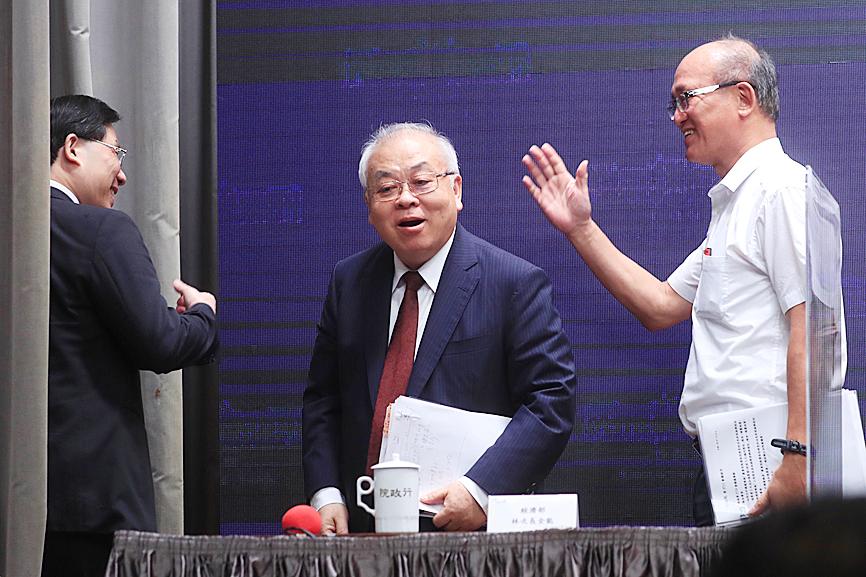The Executive Yuan yesterday unveiled a NT$210 billion (US$7.11 billion) budget proposal for COVID-19 relief, with NT$137.5 billion earmarked for economic stimulus for sectors hit hard by the pandemic.
Under the Special Act on COVID-19 Prevention, Relief and Recovery (嚴重特殊傳染性肺炎防治及紓困振興特別條例) the government was authorized — depending on developments amid the pandemic — to issue a second stimulus budget that does not exceed the first one, which in April had its cap increased to NT$210 billion.
The second budget was proposed because the nation’s export-oriented manufacturing industry has suffered due to a weak global economy, while the tourism and transportation industries need more relief due to restrictions on inbound visitors, the Directorate-General of Budget, Accounting and Statistics (DGBAS) told a news conference at the Executive Yuan in Taipei.

Photo: CNA
The increase would be funded entirely by borrowing, the DGBAS said.
The Ministry of Economic Affairs would receive the largest slice, NT$137.5 billion, of which NT$38.2 billion would be used to offset a shortage of funds for the Triple Stimulus Vouchers; NT$45 billion would be to guarantee loans companies had taken out; and NT$37.8 billion would cover salaries and operational costs of businesses in service, trade, exhibition, manufacturing and manufacturing-related industries, the DGBAS said.
The Triple Stimulus Vouchers cost NT$51.1 billion, it said.
The Ministry of Health and Welfare would be given NT$37.4 billion, including NT$2 billion for research and development of COVID-19 vaccines; NT$11.6 billion for purchasing such vaccines; NT$12 billion in bonuses and reimbursements to personnel involved in disease prevention; and NT$5.3 billion for the government’s response to the pandemic, the proposal showed.
The Ministry of Transportation and Communications would receive NT$9.8 billion, including NT$6.8 billion to subsidize salaries for travel agency employees, tour guides and stores at international airports; NT$2 billion for airports to cover shortfalls in landing and royalty fees; NT$400 million for transportation companies that carried people from airports after they were ordered into quarantine; and NT$200 million to hotels enlisted by local governments to accommodate people ordered into isolation, it showed.
The Council of Agriculture would receive NT$19.1 billion, including NT$18.4 billion in subsidies for fishers and NT$400 million to cover losses sustained by the seafood industry, it showed.
The duration of the budget for disease prevention has been extended, with the deadline moved from December to June next year, DGBAS Department of General Fund Director-General Chang Wei-ming (張惟明) said.
Subsidies for salaries in industries overseen by the Ministry of Economic Affairs and the Ministry of Transportation and Communications would be extended from the end of the third quarter to the end of the year, officials said.
The budget request is to be submitted to the Legislative Yuan for review.
Democratic Progressive Party caucus whip Ker Chien-ming (柯建銘) said that due to the budget request, a second extraordinary session seems inevitable.
The extraordinary session would likely begin after the Aug. 15 Kaohsiung mayoral by-election, Ker said.

CHAOS: Iranians took to the streets playing celebratory music after reports of Khamenei’s death on Saturday, while mourners also gathered in Tehran yesterday Iranian Supreme Leader Ayatollah Ali Khamenei was killed in a major attack on Iran launched by Israel and the US, throwing the future of the Islamic republic into doubt and raising the risk of regional instability. Iranian state television and the state-run IRNA news agency announced the 86-year-old’s death early yesterday. US President Donald Trump said it gave Iranians their “greatest chance” to “take back” their country. The announcements came after a joint US and Israeli aerial bombardment that targeted Iranian military and governmental sites. Trump said the “heavy and pinpoint bombing” would continue through the week or as long

TRUST: The KMT said it respected the US’ timing and considerations, and hoped it would continue to honor its commitments to helping Taiwan bolster its defenses and deterrence US President Donald Trump is delaying a multibillion-dollar arms sale to Taiwan to ensure his visit to Beijing is successful, a New York Times report said. The weapons sales package has stalled in the US Department of State, the report said, citing US officials it did not identify. The White House has told agencies not to push forward ahead of Trump’s meeting with Chinese President Xi Jinping (習近平), it said. The two last month held a phone call to discuss trade and geopolitical flashpoints ahead of the summit. Xi raised the Taiwan issue and urged the US to handle arms sales to

BIG SPENDERS: Foreign investors bought the most Taiwan equities since 2005, signaling confidence that an AI boom would continue to benefit chipmakers Taiwan Semiconductor Manufacturing Co’s (TSMC, 台積電) market capitalization swelled to US$2 trillion for the first time following a 4.25 percent rally in its American depositary receipts (ADR) overnight, putting the world’s biggest contract chipmaker sixth on the list of the world’s biggest companies by market capitalization, just behind Amazon.com Inc. The site CompaniesMarketcap.com ranked TSMC ahead of Saudi Aramco and Meta Platforms Inc. The Taiwanese company’s ADRs on Tuesday surged to US$385.75 on the New York Stock Exchange, as strong demand for artificial intelligence (AI) applications led to chip supply constraints and boost revenue growth to record-breaking levels. Each TSMC ADR represents

Pro-democracy media tycoon Jimmy Lai’s (黎智英) fraud conviction and prison sentence were yesterday overturned by a Hong Kong court, in a surprise legal decision that comes soon after Lai was jailed for 20 years on a separate national security charge. Judges Jeremy Poon (潘兆初), Anthea Pang (彭寶琴) and Derek Pang (彭偉昌) said in the judgement that they allowed the appeal from Lai, and another defendant in the case, to proceed, as a lower court judge had “erred.” “The Court of Appeal gave them leave to appeal against their conviction, allowed their appeals, quashed the convictions and set aside the sentences,” the judges